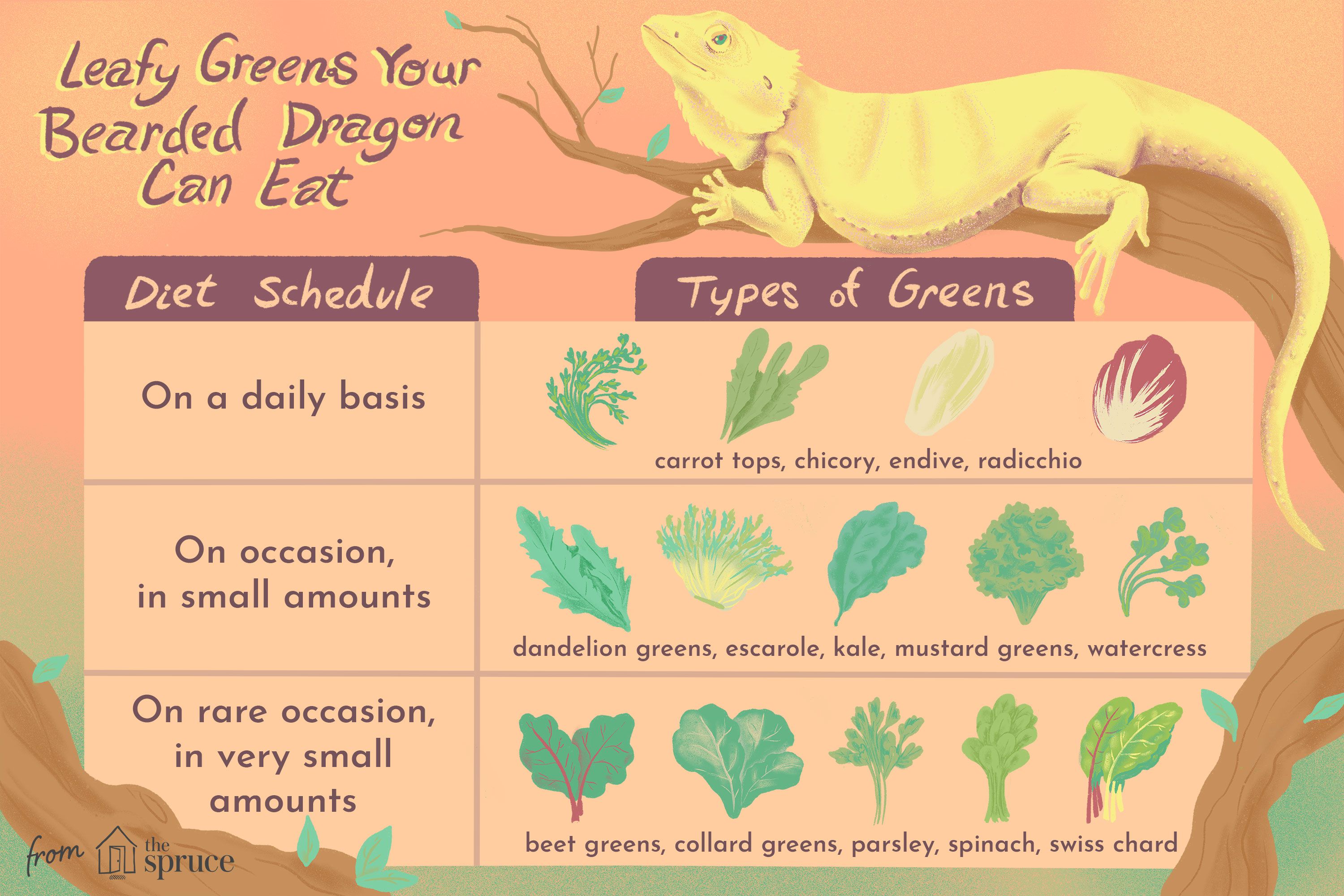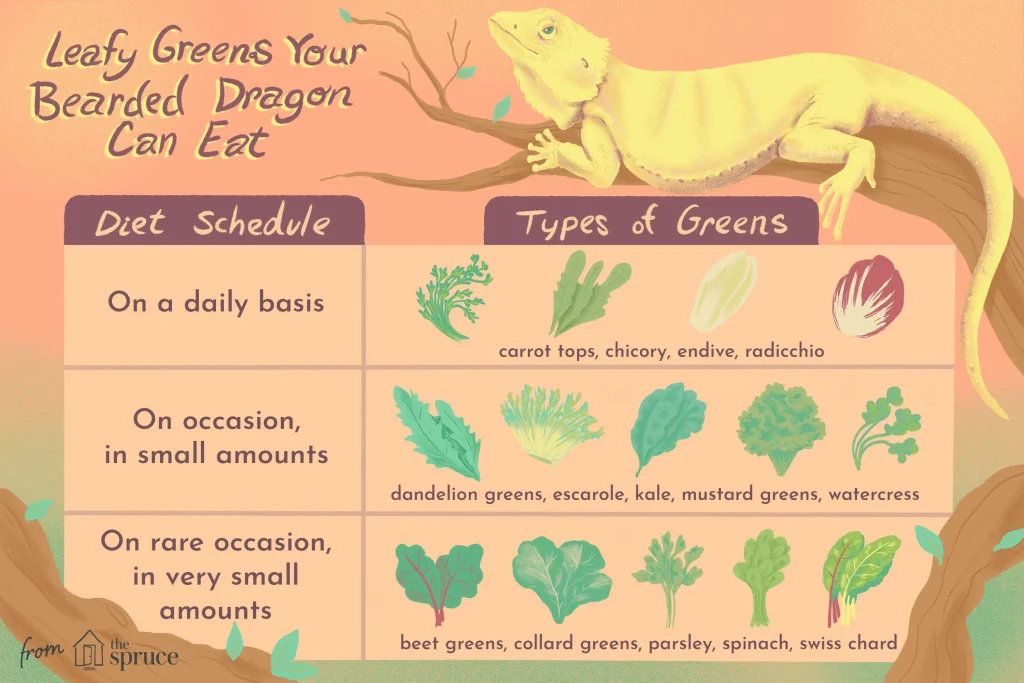Do you have a bearded dragon as your pet? If so, you may be wondering if mustard greens are a good addition to their diet. As a responsible pet owner, it’s essential to provide your bearded dragon with a well-balanced and nutritious diet. In this article, we will explore the benefits of feeding mustard greens to your bearded dragon and provide you with all the necessary information you need to make an informed decision.
Mustard greens are packed with vitamins and nutrients that can be beneficial to your bearded dragon’s health. However, it’s essential to understand the right amount to feed them and how often. By the end of this article, you will have a better understanding of whether or not mustard greens are good for your bearded dragon and how they can be incorporated into their diet. So let’s dive in and find out more!

Are Mustard Greens Good for Bearded Dragons?
Bearded dragons are unique and fascinating creatures that have captured the hearts of pet owners around the world. As a responsible pet owner, it is crucial to provide your bearded dragon with a healthy and balanced diet. One of the most important aspects of a bearded dragon’s diet is the greens that they consume.
What are Mustard Greens?
Mustard greens are leafy green vegetables that belong to the Brassica family, which includes broccoli, kale, and cauliflower. They are known for their spicy and slightly bitter taste, and are commonly used in salads, stir-fries, and soups. Mustard greens are also a popular choice for pet owners who are looking to provide their bearded dragons with a nutritious and healthy diet.
Nutritional Value of Mustard Greens
Mustard greens are packed with a variety of vitamins and minerals that are essential for a bearded dragon’s health. They are an excellent source of vitamin A, vitamin C, calcium, and iron. Mustard greens also contain antioxidants, which help to protect the body against cellular damage caused by free radicals.
Benefits of Mustard Greens for Bearded Dragons
Mustard greens are a great addition to a bearded dragon’s diet for several reasons. Firstly, they are low in oxalates, which can be harmful to bearded dragons in large amounts. Secondly, they are high in calcium, which is essential for healthy bones and teeth. Finally, they are also high in fiber, which can help to regulate a bearded dragon’s digestive system.
How to Feed Mustard Greens to Bearded Dragons
When feeding mustard greens to your bearded dragon, it is important to wash them thoroughly to remove any dirt or debris. You can then chop them into small pieces and mix them in with your bearded dragon’s other greens. It is also a good idea to rotate the greens that you feed your bearded dragon on a regular basis to ensure that they are getting a variety of nutrients.
Mustard Greens vs. Other Greens
While mustard greens are a great choice for bearded dragons, there are also other greens that you can feed your pet. Some of the most popular greens for bearded dragons include collard greens, kale, and dandelion greens. Each of these greens has its own unique nutritional profile, so it is important to offer a variety of greens to ensure that your bearded dragon is getting all the nutrients that it needs.
Collard Greens
Collard greens are a great source of vitamin A, vitamin C, and calcium. They are also low in oxalates, making them a safe choice for bearded dragons.
Kale
Kale is another great choice for bearded dragons, as it is high in calcium, vitamin A, and vitamin C. However, it is also high in oxalates, so it should be fed in moderation.
Dandelion Greens
Dandelion greens are an excellent source of calcium and vitamin A. They are also low in oxalates, making them a safe choice for bearded dragons.
In Conclusion
Mustard greens are a nutritious and healthy addition to a bearded dragon’s diet. They are packed with essential vitamins and minerals, and are low in oxalates, making them a safe choice for your pet. However, it is important to also offer a variety of other greens to ensure that your bearded dragon is getting all the nutrients that it needs. By providing your bearded dragon with a balanced and healthy diet, you can help to ensure that it lives a long and happy life.
Frequently Asked Questions
Bearded dragons are popular pets, and their owners are always looking for the best ways to care for them. One question that often comes up is whether mustard greens are good for bearded dragons. Here are some answers to common questions about feeding mustard greens to your bearded dragon.
What are Mustard Greens?
Mustard greens are leafy vegetables that are part of the Brassica family. They are often used in cooking and contain many vitamins and minerals that are beneficial for humans. Mustard greens are also a good source of fiber and have a low oxalate content, making them a good choice for bearded dragons.
When feeding mustard greens to your bearded dragon, it is important to make sure they are fresh and free from any pesticides or chemicals. You can feed mustard greens to your bearded dragon raw or cooked, but make sure to chop them into small pieces to make them easier to digest.
Are Mustard Greens Good for Bearded Dragons?
Yes, mustard greens are a great addition to a bearded dragon’s diet. They are low in fat and high in fiber, which can help with digestion. Mustard greens are also a good source of calcium, which is important for maintaining strong bones in bearded dragons. They are also high in vitamin A, which is essential for healthy eyesight and a strong immune system.
However, it is important to remember that mustard greens should not be the only food in your bearded dragon’s diet. A balanced diet that includes a variety of fruits, vegetables, and protein sources is essential for your bearded dragon’s health and well-being.
How Often Should I Feed Mustard Greens to My Bearded Dragon?
You can feed mustard greens to your bearded dragon once or twice a week as part of a balanced diet. It is important to vary your bearded dragon’s diet and not rely on one type of food. You can also rotate other leafy greens, such as collard greens, kale, and dandelion greens, to provide a variety of nutrients and flavors.
When feeding mustard greens, make sure to remove any uneaten portions after a few hours to prevent spoilage and bacterial growth.
Can Mustard Greens Cause Health Problems for Bearded Dragons?
While mustard greens are generally safe for bearded dragons to eat, they can cause health problems if fed in excess. Mustard greens contain goitrogens, which can interfere with thyroid function in large amounts. However, this is only a concern if your bearded dragon is eating large amounts of mustard greens on a regular basis.
It is important to remember that a varied diet is key to preventing health problems in bearded dragons. Make sure to offer a variety of fruits, vegetables, and protein sources to ensure your bearded dragon is getting all the nutrients they need.
Can Baby Bearded Dragons Eat Mustard Greens?
Yes, baby bearded dragons can eat mustard greens, but they should be offered in moderation. Baby bearded dragons require more protein than adult bearded dragons, so make sure to offer a variety of protein sources such as crickets, mealworms, and dubia roaches.
It is also important to chop the mustard greens into small pieces to make them easier for baby bearded dragons to digest. As with adult bearded dragons, make sure to vary your baby bearded dragon’s diet and offer a variety of fruits, vegetables, and protein sources.
Preparing and storing greens for reptiles
In conclusion, mustard greens can be a great addition to your bearded dragon’s diet. As with any new food, it’s important to introduce it slowly and in small quantities to avoid any digestive issues.
Not only do mustard greens provide a variety of essential nutrients, such as calcium and vitamin A, but they also offer a different texture and taste compared to other commonly fed greens. This can help keep your bearded dragon interested in their food and prevent boredom.
However, it’s important to note that every bearded dragon is unique and may have different dietary needs. Consulting with a veterinarian who specializes in reptile health can help ensure that your bearded dragon is getting a balanced and healthy diet.


